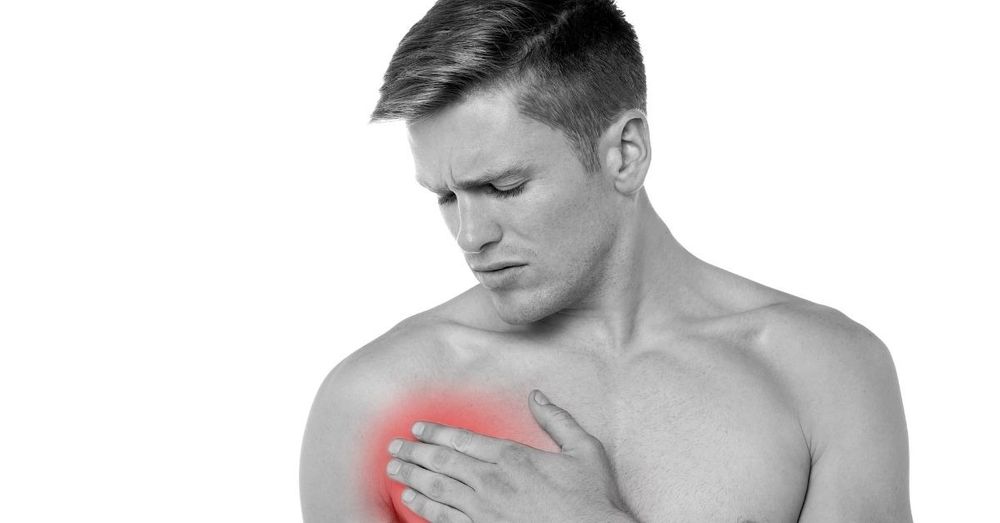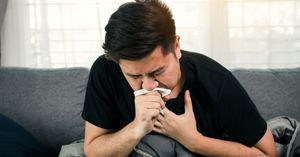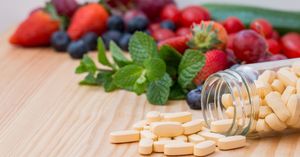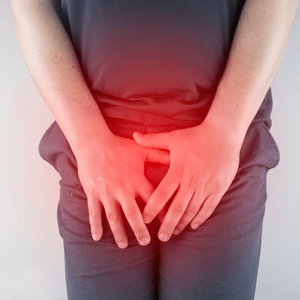Chest pain can be discomforting and frightening, but it does not always indicate a heart attack. Chest pain may occur due to gas, indigestion, and other gastric conditions such as Crohn's disease and ulcerative colitis. It is common to experience heaviness in chest due to gas after a big meal.
In this article, we will learn about chest pain due to gas, its symptoms, causes, and some home remedies to help you with.
Symptoms of Chest Pain Due to Gas
Chest pain due to gas may cause heaviness or tightness around the chest area. Symptoms of chest pain from gas generally reduce in severity with time.
It may also lead to the following symptoms:
- Bloating
- Belching or burping
- Decrease or loss of appetite
- Gas which may pass out voluntarily (with force) or involuntarily (on its own)
- Pain involving the different parts of the stomach (abdomen) from time to time
- Heartburn
- Irritability and lack of concentration
- Uneasiness
Gas Pain Vs. Heart Pain
Both gas and heart attack may cause discomfort and pain in the chest area. It is crucial to know the difference between chest pain due to gas and the one resulting from a heart attack.
Gas pain, on one hand, is preceded by symptoms of bloating, excessive belching, burning sensation in the stomach and food pipe and heaviness in the chest. On the other hand, as per a study, pain due to a heart attack starts as tightness in the centre of the chest followed by pain on the left side of the chest.
While gas pain starts as stabbing pain in the abdomen symptoms, which become less severe with time, the heart pain intensifies and becomes severe quickly. Heart pain may be accompanied by breathing difficulties and shortness of breath. Heart pain may also cause fainting. Here is a detailed explanation of how they are different.
Causes of Gas Pain in the Chest
Heaviness in the chest due to gas or pain may have multiple causes:
1. Overeating
Overeating often causes bloating, belching, heaviness, and sometimes pain around the chest area. Left side chest pain due to gas may be a result of overeating.
2. Gastrointestinal Reflux (Heartburn)
Heartburn has nothing to do with the heart. It results from indigestion. Heartburn is a burning sensation in the lower chest area often accompanied by a sour or bitter taste in the mouth and throat. It is a common cause of chest pain due to gas.
3. Intolerance Towards Certain Foods
Many develop intolerance towards certain foods. Intolerance is the inability to digest because of a lack of certain digestive enzymes in the body. Lactose intolerance and gluten intolerance are common and may lead to bloating and gas pain.
4. Eating Contaminated Food
Food poisoning results from eating contaminated food and may cause gas buildup, bloating, and chest pain along with fever, vomiting, nausea, diarrhoea, and bloody stool.
5. Carbonated Drinks
Excessive consumption of carbonated drinks may result in gas buildup in the stomach causing discomfort and chest pain due to gas.
6. High Sugar Diet
Diet rich in sugar may irritate the stomach and produce chest pain due to gas.
7. Digestive disorders
Digestive problems may cause symptoms that mimic chest pain due to gas. Inflammatory bowel diseases such as ulcerative colitis and Crohn's disease are a few digestive conditions that may result in gas buildup leading to left side chest pain due to gas.
8. Excessive fibre-rich diet
Adequate fibre is good for our digestive system. However, consumption of excessive fibres may result in the gas buildup leading to chest pain due to gas.
Diagnosis for Chest Pain Due to Gas
Chest pain due to gas may not get fully diagnosed by a routine physical examination. Hence, your doctor may recommend you to undergo the following tests:
1. Electrocardiogram (ECG)
ECG eliminates the chances of chest pain due to a heart attack. Once it is clear that the chest pain is not due to a heart problem, your doctor may recommend more tests.
2. Endoscopy
Gastrointestinal tract endoscopy reveals damage in the stomach, oesophagus, and intestine. Damage may cause chest pain due to gas.
3. Ultrasound
Ultrasound or CT scan of the abdomen may reveal the inner cause of gas buildup leading to chest pain due to gas. It helps to diagnose chest pain due to gastric conditions.
4. Test for Food Allergies and Intolerances
To eliminate the chances of chest pain due to food allergies and intolerances, your doctor may recommend some blood and skin tests.
5. Test for Crohn's Disease or Ulcerative Colitis
Chronic inflammatory conditions may lead to chest pain and therefore needs diagnosis.
Home Remedies for Chest Pain Due to Gas
Gas pain in the chest can be discomforting. Quick initiation of the treatment is crucial. Home remedies for chest pain due to gas are:
1. Drink Plenty of Water
Water is a natural solvent. Our body comprises 70 per cent of water. Drinking water dissolves all the blood toxins, improves digestion, and helps relieve constipation. As per a study, warm water is beneficial against chest pain due to gastric conditions. Warm water helps digest the food with ease and therefore prevents gas buildup.
2. Ginger for Quick Digestion
As per a study, ginger helps fast digestion. Consuming ginger as ginger tea, ginger powder, or fresh ginger prevents indigestion and gas buildup. Therefore, ginger is a natural remedy for chest pain due to gas or indigestion.
3. Cardio Exercises
Exercises such as running, walking, or dancing improve blood circulation resulting in better digestion. Good digestion prevents gas buildup in the body. Therefore, you must exercise daily to improve digestion, prevent gas formation, and avoid chest pain due to gas.
Other Treatments
Home remedies work when the problem lies in the lifestyle. When the underlying cause for chest pain is more complex such as chronic inflammatory conditions, food poisoning, or gallbladder disorders, the treatment options must include medications.
- Over-the-counter medications for gas and gas associated chest pain: Medicines with pantoprazole as an active ingredient may help relieve the discomforts of gas.
- Antacids for heartburn: Heartburn is a gastric reflux condition caused when excessive acid from the stomach comes to the throat and mouth, leaving a sour and bitter taste. Antacids may relieve the heartburn and chest pain associated with it.
- Antibiotics for chest pain due to gas from food poisoning: Food poisoning may result from eating contaminated food. Antibiotics help against food poisoning and relieve gas and left side chest pain due to gas.
- Treatment of gallbladder stones: Gallbladder stones may lead to excessive gas buildup resulting in chest pain. Medications to dissolve the gallbladder stones may be prescribed by the doctor. If the medicines do not work, surgery may be required to remove the stones or the entire gallbladder.
Prevention
Chest pain due to gas can be prevented by avoiding foods and drinks that contribute to gas buildup in the stomach. Try to abstain from overeating as it is a common cause of gas buildup and heaviness in the chest leading to chest pain.
Exercising and managing stress can be beneficial in the prevention of chest pain due to gas. The following tips are easy to implement in your daily routine to avoid gas buildup and prevent chest pain due to gas:
- Avoid carbonated drinks
- Avoid too much tea, and coffee
- Avoid sugary drinks
- Avoid spicy foods
- Avoid foods that cause allergies
- Avoid food to which you are intolerant
- Eat fresh to prevent food poisoning.
- Drink warm water early in the morning after waking up
- Avoid drinking water while eating food
- Stress and inadequate sleep are reasons for indigestion. Do yoga to relieve stress and get better sleep.
- Daily exercise improves blood circulation resulting in better digestion.
- Avoid overeating
- Keep yourself hydrated
Complications to Look Out For
Chest pain due to gas with no serious underlying cause may resolve on its own with home remedies.
Chest pain due to gas resulting from food poisoning may take 24 hours to resolve with proper antibiotics and oral rehydration solution.
Complications from severe food poisoning may include:
- Blood in stools
- Vomiting
- Diarrhoea for more than three days
- Dehydration
- Fever
- Blurry vision
- Tingling sensation in fingers and toes
Complications may result from gall bladder stones as well and include:
- High fever with chills
- Severe pain in the abdomen
- Skin or eyes become yellow
When to See a Doctor
Chest pain due to gas should progressively get better. If the chest pain is persistent for more than 20 minutes and worsens, it is time to see a doctor.
Consult your doctor when you see the following symptoms or other complications:
- Dizziness (head spinning)
- Nausea (feeling sick)
- Vomiting
- Severe headache
- Difficulty in breathing
Summing Up on Chest Pain Due to Gas
Chest pain is not always related to a heart attack; it can be due to gas. Chest pain due to gas shows improvement while heart attack chest pain worsens with time.
Therefore, it is critical to diagnose before taking any medication.
Chest pain caused by gas can have several reasons, from minor issues like indigestion to serious underlying conditions like gallstones. Chest pain due to gas home remedies may help relieve the symptoms. If the pain is persistent and shows other symptoms, it is best to consult a doctor.
References
- Nguyen Hoang Anh, Sun Jo Kim, January 2012; Ginger on Human Health: A Comprehensive Systematic Review of 109 Randomized Controlled Trials - https://www.ncbi.nlm.nih.gov/pmc/articles/PMC7019938/
- Garima Arora, Vera Bittner, February 2015; Chest pain characteristics and gender in the early diagnosis of acute myocardial infarction - https://pubmed.ncbi.nlm.nih.gov/25618302/














